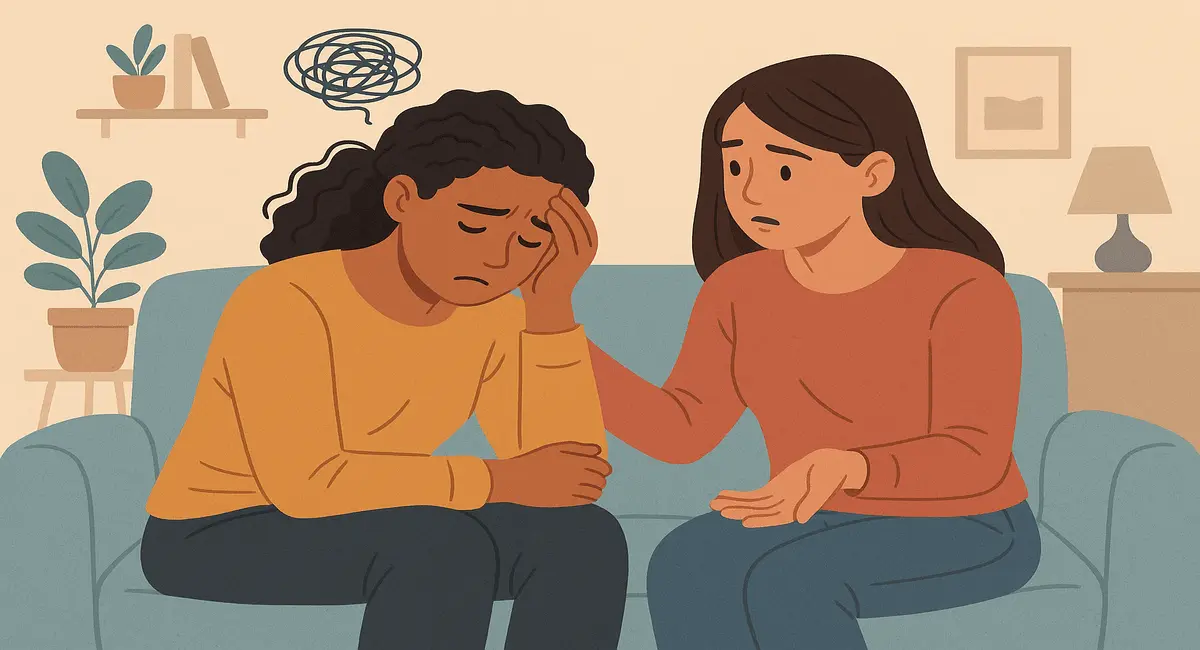Mental fatigue is a growing concern in our busy, high-stress world. Unlike regular tiredness, mental tiredness drains emotional energy, clouds thinking, and can lead to serious burnout. It affects a person’s mood, focus, and overall well-being. If someone close to you is showing signs of mental exhaustion, your understanding and support can play a crucial role in their recovery.
In this article, you’ll learn how to identify the symptoms of mental tiredness, how to help a friend struggling with mental fatigue, and the best ways to offer genuine, helpful support that promotes mental clarity, strength, and healing.
Table of Contents
Recognizing the Signs of Mental Fatigue
Mental fatigue often creeps in gradually, making it hard to identify. However, being aware of the common signs can help you spot when your friend might be struggling. Here are some key indicators:
- Chronic Exhaustion: Your friend may feel constantly drained, even after a full night’s sleep.
- Lack of Motivation: They might lose interest in activities they once enjoyed or struggle to start tasks.
- Difficulty Concentrating: Mental fog and trouble focusing are hallmark symptoms of mental exhaustion
- Irritability and Mood Swings: Small stressors may trigger disproportionate emotional reactions.
- Changes in Behavior: Look for shifts in eating, sleeping, or social habits, as these can signal underlying mental health conditions.
- Physical Symptoms: Headaches, muscle tension, and digestive issues can also accompany mental exhaustion
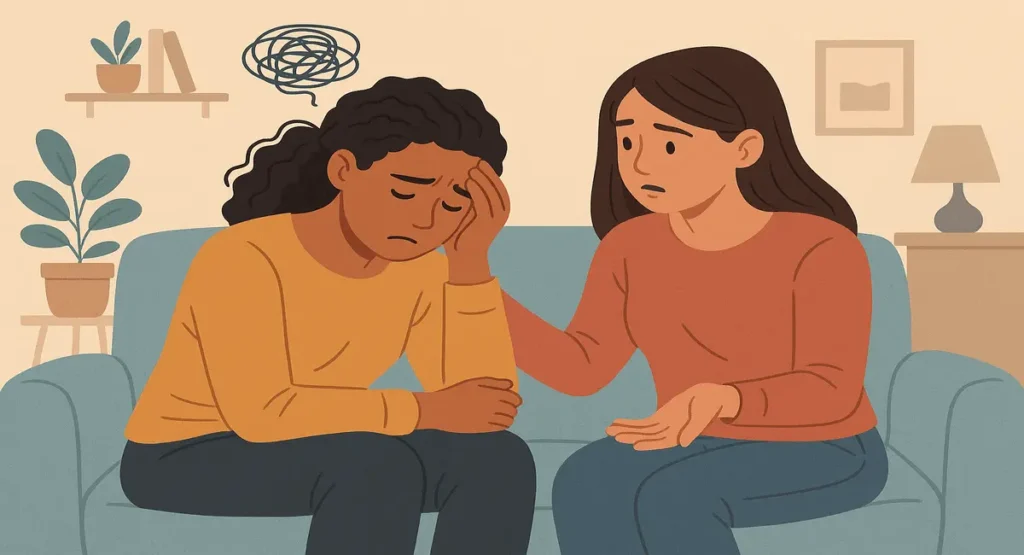
Recognizing these signs early is crucial. Mental fatigue, if left unaddressed, can lead to more severe mental health challenges like anxiety or depression. Your awareness and timely intervention can make a world of difference.
Approaching Your Friend with Care
Once you’ve noticed the signs, the next step is to approach your friend in a way that feels supportive, not intrusive. Here’s how to do it:
Choose the Right Moment
When it comes to helping a friend struggling with mental fatigue, choosing the right moment to offer support plays a crucial role in making them feel heard and safe. Choose a quiet, relaxed setting where they feel safe, supported, and not rushed. A calm environment—like a walk in the park, a cozy chat at home, or a peaceful moment over coffee—can help them open up more easily.
Avoid discussing sensitive topics when they’re overwhelmed, distracted, or surrounded by others. Respecting their emotional space shows empathy and builds trust, making it easier for them to share what they’re truly going through.
Use Empathetic Language
Start the conversation with kindness and empathy.Instead of saying, “You seem really down,” you could say, “Hey, I’ve noticed you’ve been a bit quieter than usual. Is everything okay?”
Using gentle, non-judgmental words helps your friend feel heard rather than criticized. This approach creates a safe emotional space where they feel more comfortable opening up about their struggles.
Express Genuine Concern
Let your friend know you’re coming from a place of care and understanding. Simple, heartfelt phrases like “You’re not alone, I’m here to help,” or “I genuinely care about you,” can go a long way in offering emotional reassurance. When your concern feels sincere and non-judgmental, it builds trust and makes your friend feel valued and supported. Authentic compassion can be a powerful first step in helping them feel less overwhelmed and more open to accepting help.
Listening Without Judgment
One of the most powerful ways to support someone with mental exhaustion is to listen—without judgment or interruption. Here’s how to be an effective listener:
Practice Active Listening
Give your friend your full attention when they open up. Avoid distractions—put away your phone, maintain eye contact, and show that you’re truly present in the moment. Nodding, using gentle phrases like “I understand” or “That sounds really tough,” can help them feel heard and validated. Active listening isn’t just about hearing their words—it’s about showing genuine interest in their feelings and creating a safe space where they feel comfortable expressing themselves without fear of judgment.
Avoid Offering Unsolicited Advice
When someone is dealing with mental exhaustion, they often need emotional support more than quick fixes. Jumping in with advice—even with good intentions—can make them feel misunderstood or pressured.Instead, try to really listen with care and kindness. Let them share without interruption, and if they ask for guidance, respond gently and respectfully. Creating a non-judgmental space allows your friend to feel safe, supported, and more in control of their own healing journey.
Validate Their Emotions
One of the most powerful ways to help a friend struggling with mental fatigue is to validate their feelings and let them know they’re not alone. Let them know it’s okay to feel stressed, overwhelmed, or drained. Simple affirmations like, “It’s completely valid to feel that way,” or “I can see why this is overwhelming for you,” help them feel understood and accepted.
Avoid downplaying their emotions or comparing their situation to others. Validating their feelings builds trust and reassures them that they’re not being overly sensitive—it shows that their experience truly matters.
Offering Practical Support
While emotional support is vital, practical help can also ease the burden of hronic stress. Here are some ways to offer tangible assistance:
Help with Daily Tasks
Even small acts of support—like preparing a meal, tidying up, or running a quick errand—can make a big difference in reducing their stress. By easing their daily burden, you’re showing practical care and helping them conserve mental energy for healing.
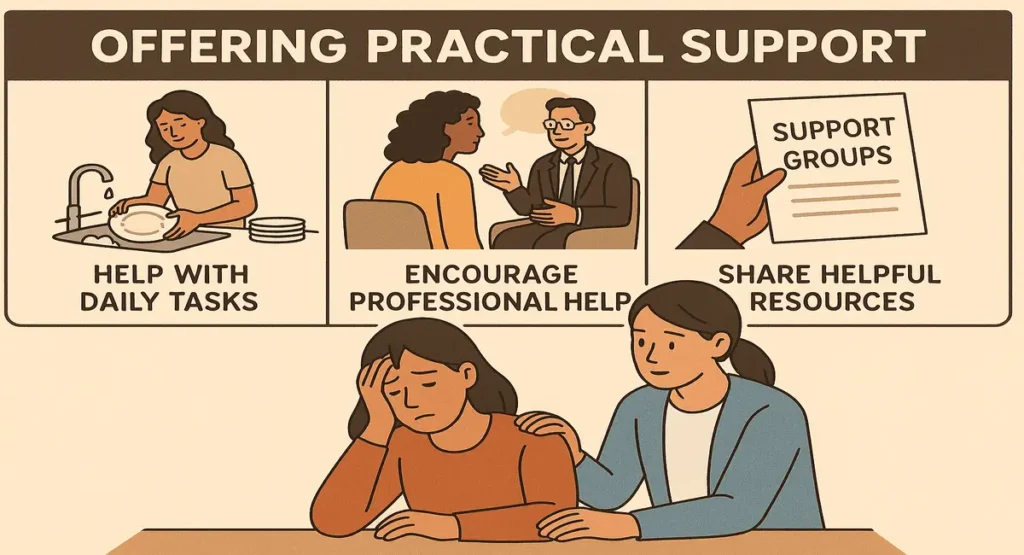
Encourage Professional Help
If your friend’s mental fatigue continues or worsens, it may be time to encourage them to speak with a professional. Offer your help in researching therapists or even accompany them to the first appointment to show that you’re there for them every step of the way.
Share Helpful Resources
Sharing reliable mental health resources, such as articles, books, or self-care apps, can offer valuable insights and practical steps for managing mental tiredness. By providing them with these tools, you empower your friend to explore new strategies for improving their well-being at their own pace.
Sometimes, practical support means finding the right tools to help your friend thrive. The Genuine Wave is a proven solution designed to alleviate mental tiredness and promote emotional well-being. Learn more about how it can make a difference in their life!
Encouraging Healthy Habits
Healthy habits can play a significant role in combating mental tiredness and building resilience. Here’s how you can encourage your friend to adopt them:
Promote Physical Activity
Physical movement helps reduce stress hormones and increases endorphins, which improve mood and mental clarity. Supporting your friend in staying active—even with small, consistent efforts—can play a key role in their recovery from cognitive fatigue.
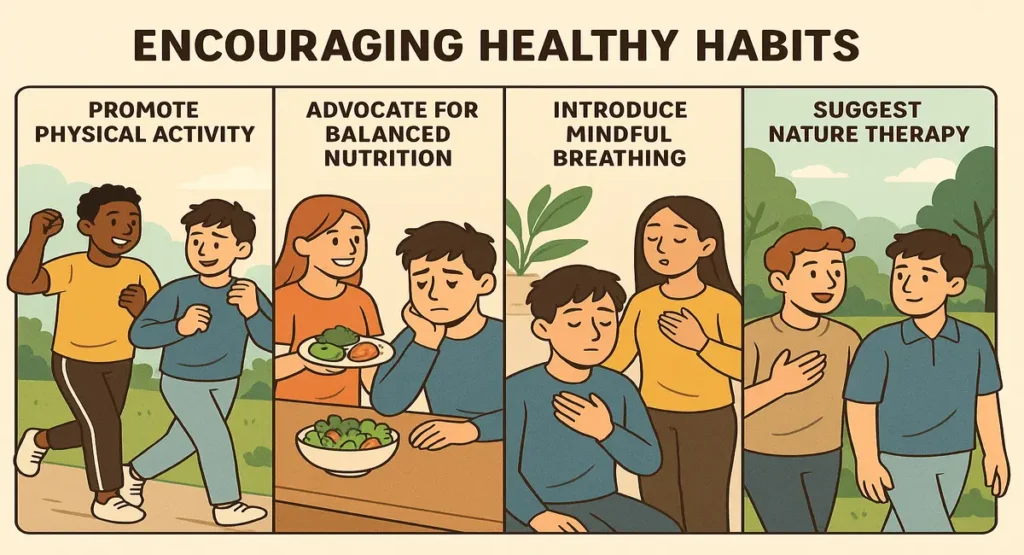
Advocate for Balanced Nutrition
Balanced nutrition plays a vital role in stabilizing mood and boosting energy levels. Helping your friend make small, healthy food choices can support their mental clarity and reduce the effects of mental fatigue over time.
Introduce Mindful Breathing
Just a few minutes of mindful breathing each day can calm the nervous system and promote emotional balance. Encouraging your friend to practice this regularly can help them feel more grounded and in control during overwhelming moments.
Looking for a simple yet effective way to combat mental fatigue? The Genuine Wave offers a unique approach to restoring mental clarity and energy. This scientifically-backed program helps you recharge your mind and body naturally. Discover how it can transform your friend’s healing journey today!“
Suggest Nature Therapy
Exposure to natural sunlight and fresh air can boost mood, improve sleep, and restore mental energy. Even short, regular moments in nature can have a powerful healing effect on mental fatigue and emotional well-being.
Being Patient and Consistent
Supporting someone with fatigue and burnout is a long-term commitment. Here’s how to stay patient and consistent:
Understand the Healing Journey
Every little step you take is still a step forward—it’s all part of getting better. Your ongoing encouragement and patience can provide the emotional stability your friend needs to keep moving forward at their own pace.
Maintain Regular Check-Ins
Frequent, caring check-ins show your friend that their well-being truly matters. These small gestures can strengthen your bond and provide a steady source of emotional support during their recovery from fatigue and burnout.
Celebrate Progress
Celebrating small wins boosts confidence and reinforces positive behavior, helping your friend stay motivated on their healing journey. Even something as small as a smile, a kind word, or saying “I’m proud of you” can really lift someone’s spirits. It’s a simple way to remind them that every little step forward still counts.
Understanding Your Limits
While your support is invaluable, it’s essential to recognize your own limits. Here’s how to help a friend struggling with mental fatigue while also taking care of your own well-being:
Set Boundaries
Healthy boundaries allow you to support others without sacrificing your own mental health. Knowing and sharing your limits helps build mutual respect and keeps your relationships healthy.You can’t support others if you’re running on empty—make sure to look after yourself first. Looking after yourself matters too.
Practice Self-Care
Practicing self-care not only restores your energy but also strengthens your ability to be there for others. Whether it’s journaling, meditating, or simply taking a break, nurturing your own well-being sets a healthy example. When you care for yourself first, you’re better equipped to offer genuine, lasting support to your friend.
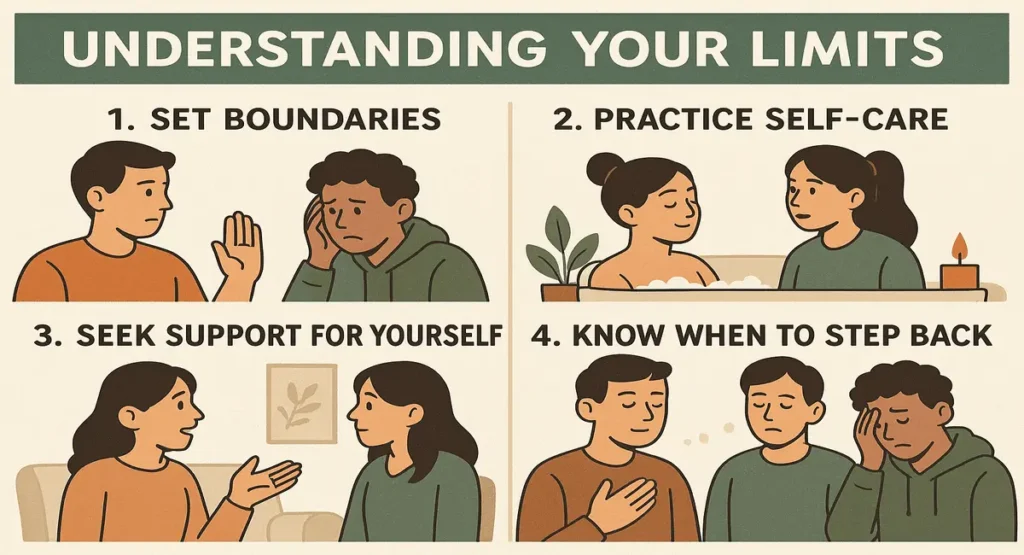
Seek Support for Yourself
Talking to someone you trust or getting advice from a mental health professional can really help you feel better and give you helpful advice. Asking for help doesn’t mean you’re weak—it means you care about your mental health and are taking steps to take care of yourself. When you’re emotionally balanced, you can offer stronger, more meaningful support to your friend in need.
Know When to Step Back
Talking to someone you trust or getting advice from a mental health professional can really help you feel better and give you helpful advice. Asking for help doesn’t mean you’re weak—it means you care about your mental health and are taking steps to take care of yourself. When you’re emotionally balanced, you can offer stronger, more meaningful support to your friend in need.
FAQs: Help a Friend Struggling With Mental Fatigue
What is mental fatigue?
Mental fatigue is a state of emotional, mental, and physical exhaustion caused by prolonged stress or overwork. It can lead to difficulty concentrating, irritability, and a lack of motivation.
How can I tell if my friend is struggling with mental fatigue?
Look for signs like chronic exhaustion, lack of motivation, difficulty concentrating, irritability, and changes in behavior or sleep patterns.
What should I avoid saying to someone with mental fatigue?
Avoid dismissive phrases like, “Just snap out of it,” or “It’s all in your head.” Instead, offer empathy and validation.
How can I encourage my friend to seek professional help?
Gently suggest the idea and offer to help them find a therapist or accompany them to their first appointment. Highlight that reaching out for support reflects resilience and courage, not vulnerability.
What are some self-care practices I can recommend to my friend?
Suggest activities like mindful breathing, nature therapy, regular exercise, balanced nutrition, and maintaining a consistent sleep schedule.
How can I take care of myself while supporting a friend?
Set boundaries, practice self-care, and seek support from others. Always prioritize your well-being, as you can’t care for others effectively if you neglect yourself.
Conclusion
To help a friend struggling with mental fatigue, offering compassionate and consistent support can make a meaningful difference in their mental health journey. By recognizing the signs, approaching them with care, listening without judgment, offering practical support, encouraging healthy habits, being patient and consistent, and understanding your limits, you can make a significant difference in their healing journey.
Supporting a friend with mental fatigue is a powerful act of care. For an additional resource to boost their mental strength and resilience, consider The Genuine Wave. This program is designed to help them regain focus, energy, and emotional balance. Click here to explore how it can support their healing journey!“
If this guide has been helpful to you, feel free to share it with others who might also find it valuable. Together, we can create a more supportive and understanding community for those struggling with mental fatigue and other mental health conditions.
Sources
At Make Human Healthy, we are committed to providing accurate and reliable health information. We ensure that all content is backed by scientific research, peer-reviewed studies, and credible health organizations. Our resources are carefully selected to maintain the highest standards of integrity, transparency, and reliability, so you can trust the information we provide.
Mind:- How can I help someone else seek help? – https://www.mind.org.uk/information-support/guides-to-support-and-services/seeking-help-for-a-mental-health-problem/helping-someone-else-seek-help/
Arcadia Universdity:- How to Help A Friend Who’s Struggling Emotionally – https://www.arcadia.edu/life-arcadia/campus-life-resources/health-wellness/counseling-services/help-friend/
Headspace:- how to help a friend going through a tough time – https://headspace.org.au/explore-topics/for-young-people/help-a-friend/
Mental Health & First Aid:- 10 Ways To Help Someone Who Is Struggling With Their Mental Health – https://www.mentalhealthfirstaid.org/2024/10/10-ways-help-someone-struggling-with-mental-health/
Mayo Clinic:- Depression: Supporting a family member or friend – https://www.mayoclinic.org/diseases-conditions/depression/in-depth/depression/art-20045943
The Jed Foundation:- Signs Your Friend Might Be Struggling Emotionally – https://jedfoundation.org/resource/signs-your-friend-might-be-struggling-emotionally/
Clinic Les Alpes:- How to help someone with burnout ? – https://cliniclesalpes.com/blog/how-to-help-someone-with-burnout/
Thriveworks:- Words of encouragement for someone with a mental illness: 8 helpful things to say – https://thriveworks.com/help-with/relationships/words-of-encouragement-for-someone-with-mental-illness/
Affiliate Disclosure: This post may contain affiliate links. If you make a purchase through these links, I may earn a small commission at no extra cost to you. This helps support the blog and allows me to continue creating helpful content. Thank you for your support!
This content is written by Dr. Arshi Thakur. If you found this content helpful, please consider sharing it on your social media to help others benefit from it!
Please note: Our website services, content, and products are for informational purposes only. Make Human Healthy does not provide medical advice, diagnosis, or treatment.

